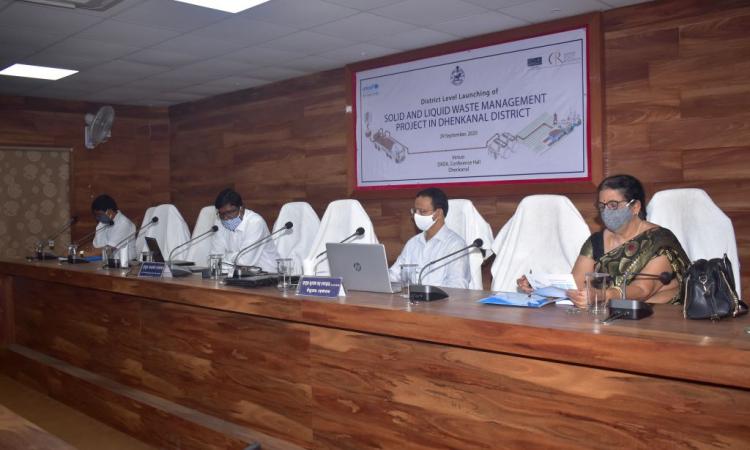
The UNICEF and the Scaling City Institutions for India (SCI-FI) initiative at the Centre for Policy Research (CPR) in collaboration with the Panchayati Raj and Drinking Water Department (PR&DW), Government of Odisha (GoO), and the District Administration, Dhenkanal are making strides towards instituting district wide approach for Solid Liquid Waste Management (SLWM).
As the country heads into the second phase of the Swachh Bharat Mission (SBM 2), the district of Dhenkanal in Odisha is piloting an innovative approach to ensuring district-wide achievement of SLWM. Access to a toilet facility has increased manifold under the aegis of the SBM putting India on the global map of sanitation leaders among developing countries.
Recognizing that the outcomes of improved sanitation cannot be sustained without the safe management of faecal waste beyond the toilet, SBM 2 emphasises Open Defection Free (ODF) sustainability, Faecal Sludge Management (FSM), Solid Waste Management and Greywater Management. The state of Odisha has already emerged as a pioneer in urban FSM, and with the recent issue of its state-level Rural Sanitation Policy, 2020, the state is set to lead the path for rural FSM and SLWM as well.
Building on this momentum and in line with the state- and national level imperatives, the Panchayati Raj and Drinking Water Department, Government of Odisha, in partnership with UNICEF and the Centre for Policy Research under its initiative, Scaling City Institutions for India: Water and Sanitation (SCI-FI), is undertaking a Pilot Project on ‘Solid and Liquid Waste Management in Rural Areas of Dhenkanal District’.
The Project will demonstrate two approaches to FSM and SLWM service delivery for rural areas in the district that hold lessons for the state- and nation-wide scale-up of FSM and SLWM services. The first will systematize urban-rural convergence for Faecal Sludge Management by formally ‘plugging in’ Gram Panchayats (GPs) located within 10 km radius from the Dhenkanal Urban Local Body to the urban Faecal Sludge Treatment Plant (FSTP).
The second, focusing on rural areas outside of the plugging-in boundary, will create clusters of GPs for SLWM planning and service delivery, as well as, demonstrate a Greenfield SLWM system in one of the identified clusters. Furthermore, the Project will develop a novel District Sanitation Plan, covering all aspects for successful SLWM interventions, including IEC, Capacity Building, Technology Selection, among others.
The District Administration of Dhenkanal in collaboration with the UNICEF and the SCI-FI team, formally launched the initiative on urban-rural convergence for FSM on September 29, 2020, via videoconferencing. Kicking off the proceedings, Project Director, District Rural Development Agency (DRDA), Dhenkanal, stated, “Dhenkanal Municipality has become a model for pioneering faecal sludge and septage management in the country. Our priority is to extend these urban facilities to the rural areas to improve the quality of life of the rural populace.”
Ms Monika O. Nielsen, Chief of Field Office, UNICEF Odisha remarked, “UNICEF is delighted to demonstrate the operationalization of the policy through the pilot project on solid and liquid waste management in rural areas of Dhenkanal district with the Centre for Policy Research.”
Praising the Project’s two-pronged approach to enabling district-wide as highly unique, comprehensive and relevant for state and nation-wide efforts on SLWM in rural areas, Mr Sujoy Majumdar, WASH Specialist, UNICEF said, “We are certain that the Project will not only enable Dhenkanal to emerge as one of the first districts in India to have safely managed sanitation, but also show the path for many more districts and states.”
Shubhagato Dasgupta, Senior Fellow and SCI-FI’s Project Director, said, “I am happy that today’s workshop will pave the way for the success of urban-rural convergence on SLWM under the committed leadership of District Collector, Dhenkanal, with the active participation of other stakeholders in the district including the Urban Local Bodies and Panchayati Raj Institutions”.
The District Administration expressed whole-hearted support to the Pilot Project with the Collector and District Magistrate, Dhenkanal District, informing that processes are currently underway for signing an agreement with the Dhenkanal Municipality to formalize the urban-rural FSM convergence for service delivery in rural areas.
The launch concluded with the Additional Project Director, DRDA, Dhenkanal affirming that the Project will immensely benefit the district’s rural population and thanking all the project partners.
For further information and to schedule interviews with the concerned stakeholders, please write to sci-fi@cprindia.org or shubhagato@cprindia.org or hrudananda@cprindia.org or pooja@cprindia.org
/articles/dhenkanal-gears-better-waste-management